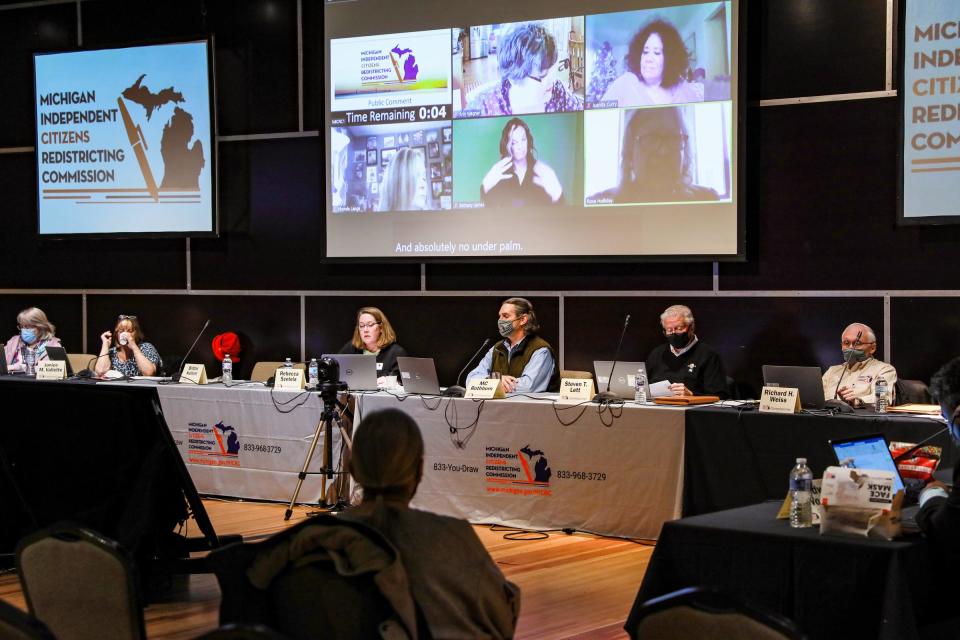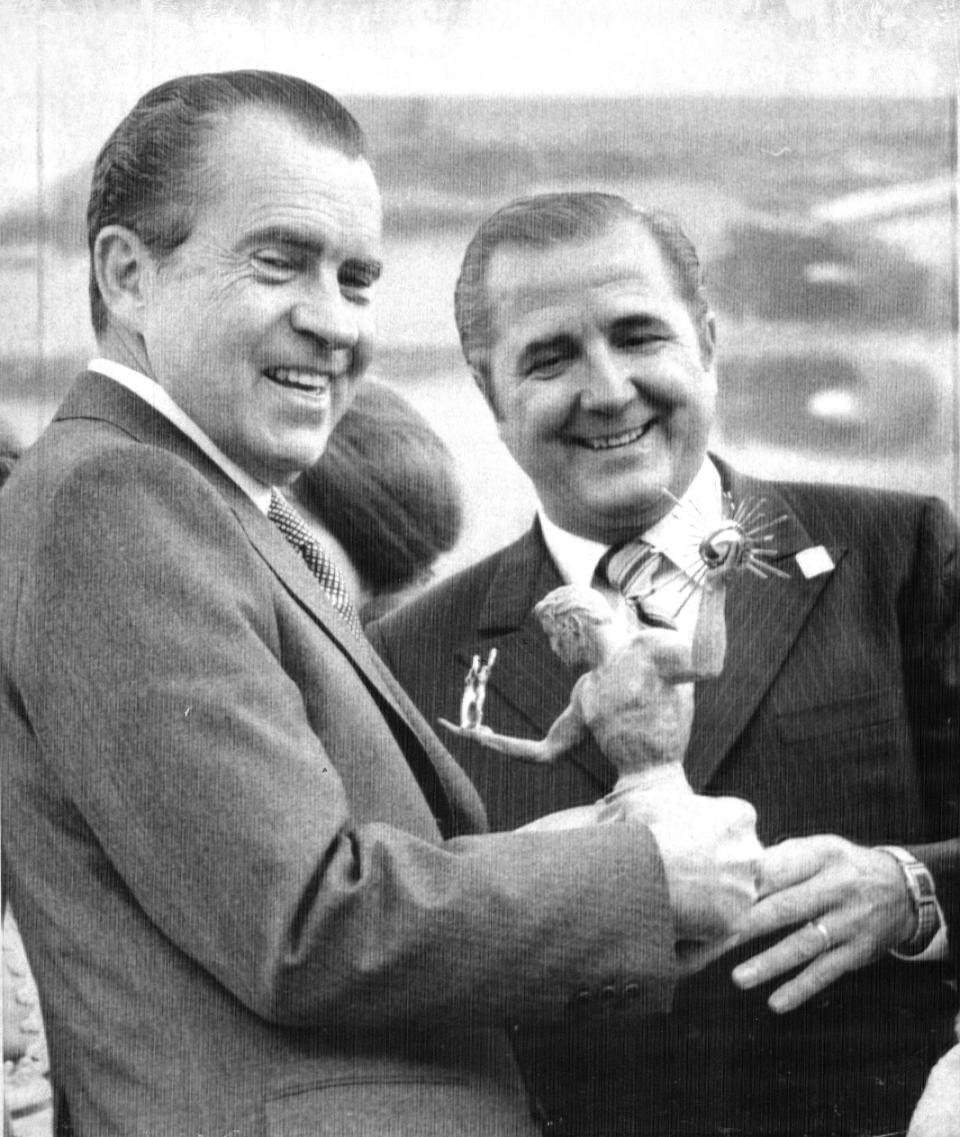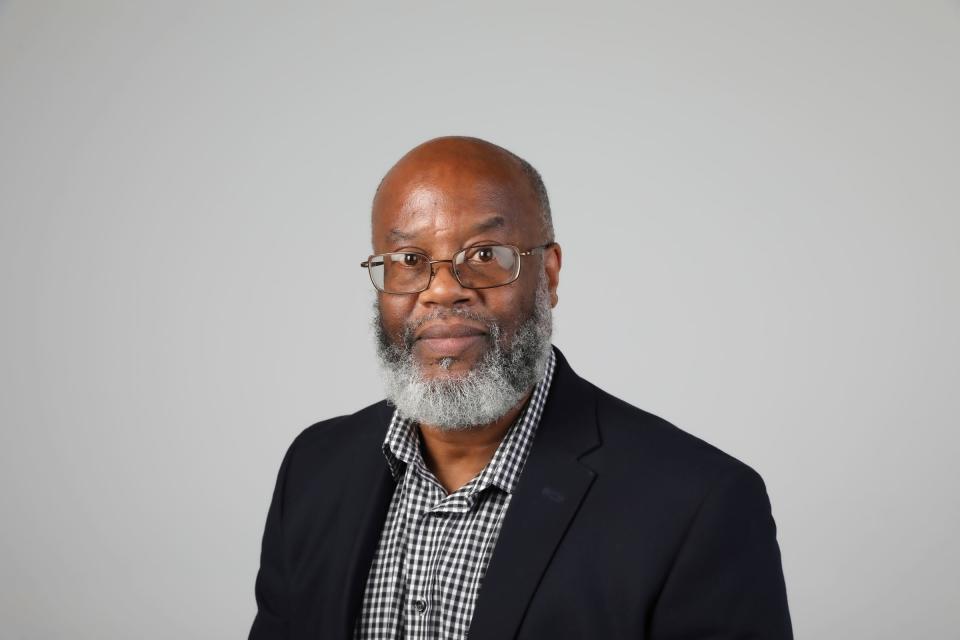New Democratic majority left out Black Detroiters. We deserve representation. | Opinion
- Oops!Something went wrong.Please try again later.
When it comes to Black people, and the power of the Black vote, the simple fact is that race generally matters a whole lot more than party affiliation. That’s because Black people are prone to trust other Black people more than they do any political party, even if that party is the Democratic Party. And even if we vote for that party over 90% of the time and are considered that party’s most reliable block of voters.
Because race still matters. A lot. Even in 2024. Or haven’t you been paying attention?
And yes, I’m aware Detroit has a white mayor, elected by Black voters in this majority Black city. I noticed.
That doesn’t change the fact that nowhere more than Detroit, arguably the Blackest big city in America, is the political relevance of race more obvious — and more potent. Which is why Michigan's newly redistricted legislative map now has to go back to the drawing board to be reconfigured in time for the 2024 election.
New boundaries bolstered Democrats but diluted Black representation
That being said, and to be fair, we have to remember that the whole reason the redistricting commission was formed was because Michigan districts were so wackily gerrymandered that Democrats stood no chance of gaining proportionate representation, no matter how many Democrats showed up at the polls year after year. In 2018, Michigan voters overwhelmingly approved a ballot measure to create a citizen-led redistricting commission. The commission's new maps were drawn after the 2020 census, and used for the first time in the 2022 election. The new districts balanced the two political parties, but left Black Detroiters with less direct representation.
Last November, the lawsuit Agee v. Benson went to trial alleging that the legislative boundaries drawn up by the Michigan Independent Citizens Redistricting Commission treated Black voters unfairly by diluting Black voting power in more than a dozen Detroit-area legislative districts. The following month, in December, a panel of three federal judges ruled unanimously in favor of the plaintiffs. The court will decide whether to approve the new state House maps it ordered the commission to draw by March 29. All of the plaintiffs were Black folks who basically accused the commission of neutering the Black vote by emphasizing the importance of allegiance to the Democratic Party over the importance of having proportional elected racial representation in legislative bodies.
Trust us. We’re the Democrats, and we’ll take care of you.

It's more than a little interesting to note that each of the judges (all white) were appointed by former President George W. Bush, a Republican. Conversely, the plaintiffs were 19 Black Michiganders living in 13 different state House and Senate districts that each include a portion of Detroit, a longtime Democratic stronghold. They originally filed their lawsuit in March 2022.
It's also interesting to note how the judges ruled that the commission “violated the United States Constitution by predominantly focusing on race, minimizing Black voting age population in various Detroit-area districts in a way that denied Black voters the ability to select minority candidates in primaries,” according to a Dec. 22, 2023 article that appeared in Bloomberg Law. So what they seem to be saying is that the commission, by focusing too much on race, managed to create a somewhat race-neutral map that ticked off a whole lot of Black people precisely because it ignored the importance of race.
How does that work, exactly?
Map cracked Republican chokehold, but deprived one of America's Blackest cities of representation in Congress
The article further pointed out the overwhelming concern, expressed by numerous worried Democrats, that this decision to re-redraw the district map could effectively put the brakes on the progress gained in the celebrated Democratic sweep of 2022, when Democrats won not only the re-election of Gov. Gretchen Whitmer, Attorney General Dana Nessel and Secretary of State Jocelyn Benson, but both chambers of the state Legislature for the first time in more than 40 years. Courtesy of the newly-drawn commission map; a map that leveraged an unparalleled victory for Michigan Democrats at a critical time by cracking the Republican chokehold — while also depriving Detroit of any Black representation in the U.S. Congress for the first time in, well, more than 70 years, reducing the number of majority Black districts and shrinking the number of Black elected officials serving in the state Legislature.
So for some, this is where it gets sticky. Because how loud should Michigan Democrats celebrate their victories of 2022 when their new majority doesn’t include any Black representation in Congress from the Blackest big city in America? Is it enough to say, “Well, at least Democrats are in the majority in Lansing”?
I said it gets sticky for some, because for most Black folks it’s really not that sticky of an issue at all. And anyone who understands the history of Black people in Detroit shouldn’t have any problem understanding why representation matters. Specifically, we only need to recall the circumstances surrounding the election of Mayor Coleman A. Young in 1974, the first Black mayor in Detroit’s history, and a Democrat.
But then, so was every other mayor of Detroit in Detroit’s history, since 1950 when Albert E. Cobo was first elected. Cobo’s racist history was one benefit of selling the naming rights to Cobo Hall, now renamed Huntington Place. Louis C. Miriani, who followed Cobo (1957-1962) was Detroit’s only Republican mayor in recent memory.
Biden is trailing in Michigan polls. The party must engage Black voters.
After Miriani came Jerome Cavanaugh, a Democratic white progressive elected in 1962 who won with a resounding 85% of the Black vote. Cavanaugh fought hard against discrimination, and in some ways was viewed as the Great White Hope who would begin redressing the many wrongs endured by the city’s serially oppressed Black population.
However, instead of saving the day, things got progressively worse for Black people. But it wasn’t all because of Cavanaugh, who was totally blindsided by the white-hot intensity of all that pent up Black anger that exploded into the 1967 rebellion. Nevertheless, Cavanaugh’s inability to be even remotely aware that so many Black residents of his city were so discontent on his watch called his mayoral effectiveness into question — and caused Black folks to question why they thought they could count on him as much as they had.
Cavanaugh’s downfall was followed by the disaster of Mayor Roman Gribbs, a Democrat elected in 1970, and under whose watch STRESS was born. An acronym that stood for Stop The Robberies Enjoy Safe Streets, STRESS became more accurately known in Black neighborhoods for being an out of control police unit that randomly and viciously targeted Black males.

Coleman Young's vocal opposition to STRESS and his boots-on-the-ground campaign support of the newly formed Black Slate is what propelled him to office, replacing Gribbs. The Black Slate, populated largely by members of the politically influential Shrine of the Black Madonna, was formed during the 1973 election campaign by a group of race-conscious individuals committed to the idea that it was time to elect a Black mayor for Detroit. No more white saviors.
Detroit's racial politics ongoing
That may have been 50 years ago, and the Black Slate may no longer be quite the political powerhouse that it once was, but that deeply ingrained belief among many Black Detroiters that a Black city should have Black representation is still alive and kicking. And just like the election of President Barack Obama did not signal the end of racism in America, the election of Mayor Mike Duggan did not in any way signify the death of racial politics in Detroit.
Critics are passing anti-DEI laws. We have to fight back.
The way Black folks have achieved political power in this country, this state, and in this city has not been by blindly aligning themselves with the Democratic Party, although there is no doubt the Democrats are a better place to be overall. The way we achieved power was to assert strength as a solid voting bloc within that party.
So yes, it’s true that the new maps made winning easier for Michigan Democrats. And yes, it’s true that the vast majority of Black folks in Michigan — same as across the country — are Democrats, mostly because Democratic policies are far more beneficial to Black people than Republican policies, especially these days. Nevertheless, race still matters.
Because one of the primary reasons Black people are Democrats is because they believe the Democratic party is where Black people can achieve power by getting elected to office.
Once that Black voting bloc gets diluted, so does Black political power.

Free Press contributing columnist Keith A. Owens is a local writer and co-founder of Detroit Stories Quarterly and the We Are Speaking Substack newsletter and podcast. Submit a letter to the editor at freep.com/letters.
This article originally appeared on Detroit Free Press: Black voters deserve equity from Michigan redistricting lawsuit

